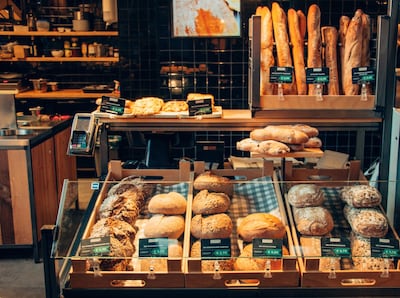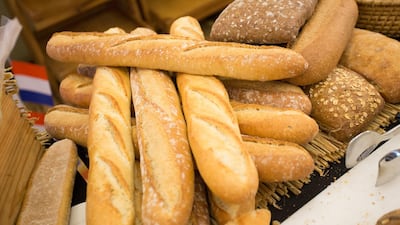France has chosen the baguette as its candidate for Unesco intangible cultural heritage status, the government said on Friday.
While berets and strings of garlic around the neck might be more stereotype than reality these days, the long loaves of bread are still seen tucked under arms all over France on a daily basis.
Data site Planetoscope estimates that about 10 billion baguettes are consumed annually in France – that's around 320 every second.
During France’s strict lockdowns during the pandemic last spring, bakeries were categorised as essential businesses and remained open.
Unesco said it will announce its decision in late 2022. "The inscription of this element would allow for the appreciation that this food practice, that is part of daily life, shared by the great majority and taken for granted, constitutes a heritage in its own right," the organisation said.
Unesco defines “intangible cultural heritage” broadly, encompassing traditions, performing arts, rituals, festivals and skills that are passed down in communities from ancestors to descendants. It confers the status on around 100 very different things around the world each year.
Among the practices recently included in the Intangible Cultural Heritage list are Al Aflaj, the traditional irrigation network system in the UAE; camel racing in the UAE and Oman; miniature art, as found in Iran, Turkey, Uzbekistan and Azerbaijan; and Sa'eed, the handmade weaving tradition in Upper Egypt.
This year’s list included sauna culture in Finland, a lantern festival in South Korea and a grass-mowing competition in Bosnia and Herzegovina.
In announcing their proposal for heritage status, the French ministry also drew attention to the steady fall in the number of boulangeries around the country, especially in rural areas.

“In 1970, there were 55,000 artisanal bakeries (one for every 790 residents) compared with 35,000 today (one for every 2,000), often in favour of baguettes produced industrially,” it said.
The baguette, despite being a seemingly immortal fixture in French life, only officially got its name in 1920 when a new law specified its minimum weight (80 grams) and maximum length (40 centimetres).
The rest of the history is rather uncertain.
Some say long loaves were already common in the 18th century; others that it took the introduction of steam ovens by Austrian baker August Zang in the 1830s for its modern incarnation to take shape.
Another links baguettes to the construction of the Paris Metro in the late 19th century, and the idea that baguettes were easier to tear up and share, avoiding arguments between the workers and the need for knives.
France selected the baguette from a shortlist that also included Paris's famed rooftops and the Biou d’Arbois harvest festival in the Jura department.

